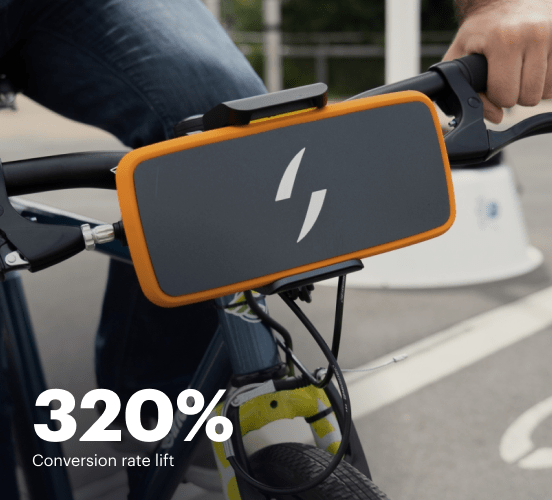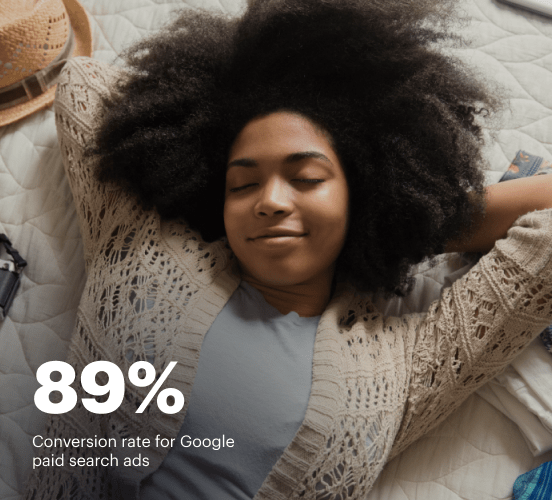Webflow vs. Pixpa: the best platform for a seamless web experience
Discover how Webflow compares to Pixpa regarding features and usability. Find out which platform provides the competitive advantage your business deserves.
Get startedSee how Instapage stacks up against the competition
| Feature | Instapage | Other builders |
| Drag-and-Drop Tools | ||
| Conversion-optimized templates | ||
| Manual and AI-powered A/B Tests | ||
| AI content suggestions | ||
| Popups and sticky bars | ||
| Canvas and grid blocks | ||
| Reusable and global elements | ||
| Form and popup builders | ||
| Built-in Heatmaps | ||
| Central analytics dashboard | ||
| Ad-to-page personalization and collections | ||
| Contacts, lists, and email | ||
| Dedicated, full-service CRO experts | ||
| Enterprise-ready platform |
Leading the way in building high-performing landing pages





Why Instapage is the smarter choice for your campaigns
Get everything you need to build, scale, and optimize high-converting landing pages—without coding.
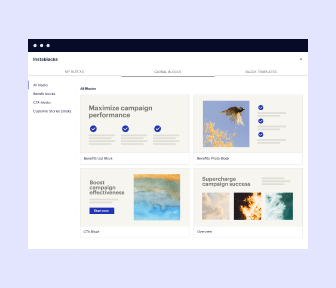
Easier page building without coding
Instapage offers a flexible and seamless page creation experience with a library of 500+ conversion-focused layouts, Instablocks®, a drag-and-drop builder, and AI content generation. With technologies like Thor Render Engine®, you can create on-brand, mobile-responsive landing pages that load quickly and start converting during initial visitor clicks.
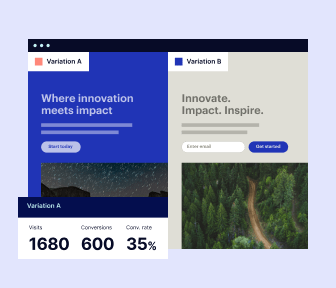
More insights — better results
Instapage lets you see in detail how each landing page experience and variation is performing so you can make targeted changes that boost page conversions. Use heatmaps for a better understanding of on-page activities, run A/B tests and AI-assisted experiments, and then track and evaluate results within robust analytics dashboards.
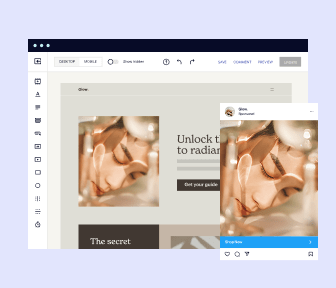
More personalized experiences
Instapage lets you quickly create high-performing landing pages tailored to each of your ad campaigns. Deliver personalized experiences for distinct audiences using dynamic text replacement. Effortlessly align specific advertisements to unique pages with AdMaps. Monitor audience-level metrics using our advanced data tools.
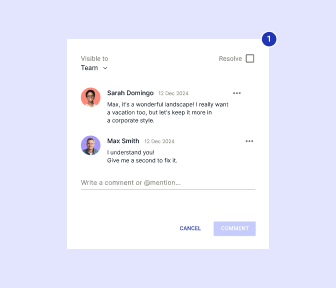
Built-in collaboration
Instapage collaboration capabilities bring your entire team together to speed up the process of landing page review, approval, and launch. No more frustrating and unnecessary revisions or edits scattered across emails. Provide instant feedback, conduct real-time page edits, and securely share your pages with outside stakeholders.
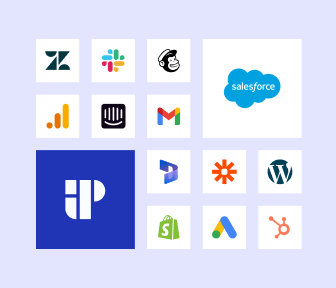
Free up time for your business
Invest time into business growth, not busy work. Launch landing pages faster with reusable forms and templates. Build once, reuse forever.
Explore all integrations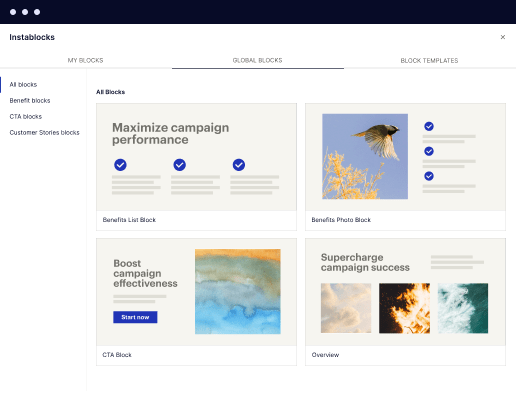
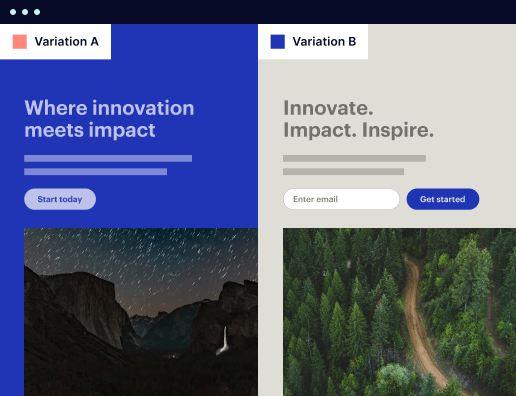
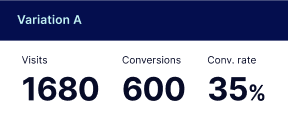
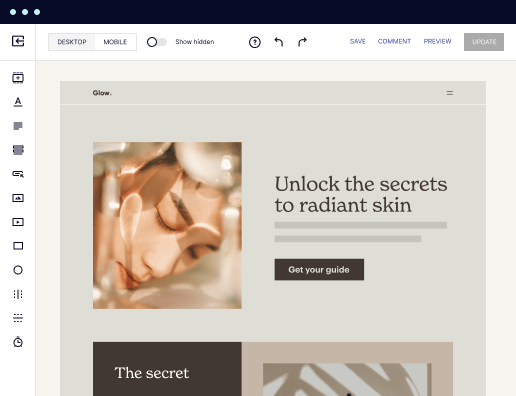

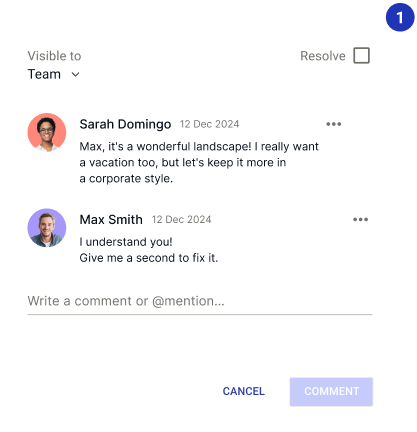
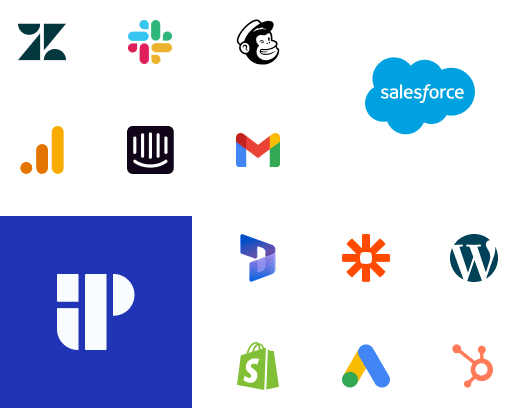
Easier page building without coding
Instapage offers a flexible and seamless page creation experience with a library of 500+ conversion-focused layouts, Instablocks®, a drag-and-drop builder, and AI content generation. With technologies like Thor Render Engine®, you can create on-brand, mobile-responsive landing pages that load quickly and start converting during initial visitor clicks.
More insights — better results
Instapage lets you see in detail how each landing page experience and variation is performing so you can make targeted changes that boost page conversions. Use heatmaps for a better understanding of on-page activities, run A/B tests and AI-assisted experiments, and then track and evaluate results within robust analytics dashboards.
More personalized experiences
Instapage lets you quickly create high-performing landing pages tailored to each of your ad campaigns. Deliver personalized experiences for distinct audiences using dynamic text replacement. Effortlessly align specific advertisements to unique pages with AdMaps. Monitor audience-level metrics using our advanced data tools.
Built-in collaboration
Instapage collaboration capabilities bring your entire team together to speed up the process of landing page review, approval, and launch. No more frustrating and unnecessary revisions or edits scattered across emails. Provide instant feedback, conduct real-time page edits, and securely share your pages with outside stakeholders.
Free up time for your business
Invest time into business growth, not busy work. Launch landing pages faster with reusable forms and templates. Build once, reuse forever.
Explore all integrationsGet started with Instapage in a few steps
-
Create your Instapage account
Start with Instapage by signing up via Google or your email. You'll get access to a free 14-day trial to discover Instapage capabilities. Feel free to cancel anytime during the 14-day trial if you decide that our product is not suitable for your business. -
Build and personalize your page
Create your first landing page from scratch or choose a template from 500+ customizable layouts. Use the drag-and-drop builder to add page elements, fonts, and backgrounds, refine content with AI, or add custom HTML, Javascript, and CSS. -
Review and make edits
Collaborate on page designs and streamline review processes. Invite your team members and stakeholders to review, edit, and provide feedback on your landing page. Collaborate knowing your page is confidential and only accessible to authorized users. -
Publish and track page performance
Publish your page to a domain or custom URL. Connect your pages to the ads you've created and track page performance within the analytics dashboard, run A/B tests and AI experiments, analyze results, and continuously optimize your landing page to maintain high conversions.
Webflow vs. Pixpa: A Clash of Titans in Digital Design
In today’s world of digital design, choices can overwhelm users, especially with platforms like Webflow and Pixpa vying for attention. Both offer unique solutions that cater to specific needs within the website creation and management space. Whether you’re a budding entrepreneur or an established brand, striking a balance between aesthetics and functionality is paramount. As we venture deeper into this comparison, we’ll uncover the strengths and potential limitations of both platforms. Stick around as we also introduce Instapage, a platform that’s making waves and challenging the status quo. Here, we’ll dissect the features, usability, support, pricing, and more to help you choose the right fit for your needs. It’s a thrilling exploration where creativity meets strategy, ensuring your online presence is not just a dream, but a vivid reality. Join us as we dig into the specifics, gearing up for a comparison that promises insights whether you aim to craft a site or polish up your existing one. The stakes are high, and both platforms are ready to deliver professional tools tailored for success. So, let’s get the ball rolling!
Introducing the Contenders
In the red corner, we have Webflow, lauded for its versatility and design capabilities, empowering users to create stunning websites without prior coding knowledge. Its strength lies in providing a visual development environment that appeals to designers and developers alike. Webflow combines powerful CMS features with an intuitive drag-and-drop interface, making it a favorite in the creative community. On the other side, we have Pixpa, the dark horse of our competition. It stands out with its straightforward approach to website creation, particularly benefiting photographers, artists, and bloggers. Pixpa emphasizes simplicity and ease of use, allowing its users to focus on showcasing their work. Both platforms have earned their stripes, achieving recognition in the industry. As we explore this matchup, we will dive into the character of each platform, assessing what sets them apart and which one might fit your profile better. Get ready for an exciting battle as we see how these heavyweights stack up in various arenas!
Feature Showdown: Who Packs More Punch?
When we talk features, both Webflow and Pixpa come equipped with tools that elevate your website-building experience. Webflow offers a plethora of customizable templates, enabling high flexibility in design. Its animation and interaction capabilities let users create dynamic elements that relay brand personality. Additionally, it integrates directly with various third-party tools, enhancing functionalities like SEO and e-commerce setups. Pixpa, while simpler, isn't far behind. It offers built-in galleries, e-commerce options, and blog setups, catering well to creatives eager to set up a portfolio without the fuss. While each platform presents noteworthy features, there’s a rival lurking in the wings that could upend this match. Keep an eye out for Instapage, celebrated for its robust landing page creation, perfect for marketers focused on conversions instead of mere aesthetics.
Usability: The Learning Experience
Navigating through Webflow and Pixpa, the usability spectrum shines brightly. Webflow, although packed with advanced functionalities, can feel overwhelming to beginners. It’s like stepping into a high-tech control room where you might need some time to find your bearings. However, for seasoned users, each feature provides an exhilarating opportunity to push creative boundaries. In contrast, Pixpa delivers a more guided experience. Its straightforward interface welcomes novices with open arms, ensuring users can jump right into creation without needing extensive tutorials. Think of it as cruising along a paved road compared to navigating a complex mountain trail. While Webflow caters to those craving depth, Pixpa focuses on straightforward design, making it ideal for users looking to launch quickly. Each platform has its charms and challenges, but with the right mindset, both can lead you to digital success.
Webflow Highlights:
- Intuitive drag-and-drop interface for seamless design.
- Extensive library of customizable templates.
- Powerful CMS for dynamic content management.
- Advanced animations and interactions to engage users.
- Robust integration with third-party applications.
Pixpa Features That Wow:
- User-friendly interface ideal for beginners.
- Integrated galleries tailored for visual artists.
- E-commerce capabilities for selling products online.
- Built-in blogging tools to share experiences.
Common Strengths of Both Platforms:
- Mobile-responsive designs ensure accessibility.
- SEO tools to help boost search visibility.
- Extensive support resources and documentation.
- Secure hosting to protect user data.
- Opportunities for social media integration.
As we wrap this round, it’s clear both platforms contribute significantly to the digital landscape. However, as both platforms step back into their corners, Instapage waits for its moment to shine, potentially offering solutions that suit more specific needs, particularly in the realm of marketing-driven sites. Its unique offerings make it a worthy contender, especially for businesses looking for a comprehensive landing page tool.
Speed & Performance: Who's the Fastest?
When it comes to performance, speed is king. Slow loading times can turn potential customers away faster than you can say ‘bounce rate’. In our investigation, both Webflow and Pixpa understand the urgency of fast loading speeds. Websites built on Webflow are renowned for their ability to deliver smooth and swift experiences, making it preferred for those prioritizing speed and performance optimization. Meanwhile, Pixpa also offers respectable loading times but occasionally face the delays typical of platforms rich in visual content. Imagine slow websites as molasses in winter—no one has time for that. The difference in performance could be the deciding factor for businesses wanting to impress visitors from the get-go. Choosing a platform that aligns with your performance needs could set the tone for user experience and conversions.
Support Systems: Who’s Got Your Back?
Support is vital when diving into a new platform, especially for those new to building websites. Webflow shines brightly with its wealth of resources, including video tutorials, detailed articles, and a community forum bustling with knowledge. They make learning accessible, providing your trusty sidekick throughout your journey. On the flip side, Pixpa offers decent support, with their help center available for immediate solutions and personalized assistance for premium users. While both platforms showcase solid support systems, Webflow slightly steals the spotlight with comprehensive resources aimed at empowering users. Their commitment to user education ensures that help is always just a click away, whether you’re struggling with a feature or looking to optimize your site’s performance.
The Pricing Puzzle: Understanding Costs
Webflow's Pricing Structure: The Pros & Cons:
- Flexible pricing plans tailored to different needs.
- Free plan for testing and exploring features available.
- Value-added features for higher-tier pricing.
- Custom pricing options for advanced e-commerce solutions.
Pixpa Pricing Breakdown: What You Should Know:
- Simple pricing structure with no hidden fees.
- Unlimited bandwidth plans suitable for creatives.
- Affordable annual pricing options for long-term users.
- Free trial to explore features before committing.
In evaluating the pricing strategies of both platforms, users find appealing options that cater to different budgets. Webflow offers flexibility with a capacity for advanced features, making it valuable for projects with specific demands. On the other hand, Pixpa focuses on affordability aimed at creatives looking to keep things straightforward. Now, bringing Instapage into the mix, its pricing strategy stands out by delivering significant value for money. Known for its focused features on lead generation and conversion, Instapage offers pricing plans that justify its features, benefiting businesses aiming for effective marketing tactics.
Looking transparently at pricing plans, both Webflow and Pixpa may appear user-friendly at first glance, but digging deeper shows where your money goes. Sometimes, you stumble upon unique features in unexpected packages, and that’s where Instapage shines—offering great value without compromising on essential tools. This is where an informed choice reveals its rewards, and you might just find the surprising advantages you’ve been seeking.
And Enter Instapage: The Game-Changer
As we delve into Instapage, it emerges as a mentor watchfully observing both contenders. Known for its streamlined approach to landing page creation, Instapage excels by offering templates specifically designed to optimize conversions, making it a favorite among marketers. Its unique proposition lies in extensive A/B testing and analytics, allowing users to refine their pages post-launch effectively. Unlike the broad strokes of Webflow and Pixpa, Instapage's targeted tools are crafted for those bent on achieving actionable results. It’s the ideal choice for businesses, keen on refining strategies for maximum impact. As we near the end of our exploration, we recognize that not all platforms are created equal. Instapage quietly positions itself as the resourceful ally that can transform your marketing endeavors into success stories. It’s a robust alternative that complements existing strategies, expanding horizons on what’s achievable in the digital realm.
In conclusion, the journey through Webflow, Pixpa, and Instapage emphasizes the importance of informed decision-making. As you navigate through technological options, your goals become the compass guiding your choice. Whether you're looking to ignite a creative portfolio or ramp up marketing efforts, the right platform can elevate your journey to new heights. Explore the unique offerings of Instapage, where precise strategies meet innovative design—an exciting next step for anyone ready to leap into the world of impactful online presence.

